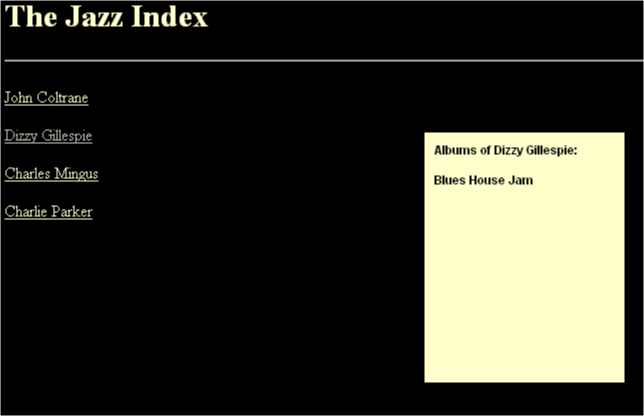Although XSLT can generate all sorts of output from an original XML file, it does not provide a binding of the displayed elements to the original XML elements. When an XML document is converted into HTML, it is not possible to modify the HTML elements on the screen and automatically reflect the changes back to the original XML document. In fact, XSLT does not provide any facilities for processing end-user input. We have to employ other technology in order to do this.
One suitable technology is JavaScript. JScript, Microsoft's version of JavaScript, provides features that make it possible to access Tamino directly from the client's web page. The Tamino JavaScript API utilizes those features. Consequently, it can only be used for clients running on a Microsoft Windows platform with the Microsoft Internet Explorer.
Apart from this restriction, the Tamino JavaScript API offers lightweight access to all relevant Tamino functions. You can query, insert, update and delete objects and control transactional behavior directly from the client.
In the following example, we use the Tamino
JavaScript API to make an interactive index web page. The stylesheet
jazzMusician-index.xsl generates such a page that lists
all the jazz musicians stored in the encyclopedia collection. When
the user moves the mouse over these entries, the corresponding artist's albums
are shown in a separate text area:

This is achieved by generating an event handler
onmouseover="javascript:displayAlbums()" for each entry and
passing the musician's ID to the function. The function first connects to
Tamino, issues a query for a
collaboration corresponding to the musician's ID, then uses the
result element of each collaboration document to
query for album documents. Finally, the title of each album is
written into a special display area (implemented as <div
id="albumArea">). Here is the complete code:
<?xml version="1.0" encoding="UTF-8"?>
<xsl:stylesheet version="1.0"
xmlns="http://www.softwareag.com/tamino/doc/examples/models/jazz/encyclopedia"
xmlns:xsl="http://www.w3.org/1999/XSL/Transform">
<xsl:output method="html" indent="yes"/>
<!-- define constant for tamino query string --> <xsl:variable name="query"> http://localhost/servlets/com.softwareag.tamino.api.servlet.TaminoFilter/tamino/jazz/encyclopedia?_XQL= </xsl:variable> <xsl:variable name="ency">http://localhost/tamino/jazz/encyclopedia</xsl:variable>
<!-- define constant for pass-thru string --> <xsl:variable name="sheet">&_xslsrc=xsl:stylesheet/</xsl:variable>
<!-- Just a single rule for the root node -->
<xsl:template match="/">
<!-- Generate HTML document root -->
<html>
<head>
<SCRIPT LANGUAGE="JavaScript"
SRC="{concat($ency,'/scripts/TaminoLib.js'}}"></SCRIPT>
<script language="JavaScript"><![CDATA[
function displayAlbums(jmid,mname) {
// create title
var aText = "Albums of "+mname+":<br>";
// construct database and collection name
// (just to have a single point of maintenance)
var dbname=
]]>
<xsl:value-of select="concat('"',$ency,'";')"/>
<![CDATA[
// prepare query
var QueryVal="e:collaboration[e:jazzMusician='"+jmid+"']";
var pageSize=0;
// create Tamino client
var QueryObj = new TaminoClient(dbname, pageSize);
// issue query
var QueryResult = QueryObj.query(QueryVal);
// strip off Tamino packaging
var xqlResult=QueryResult.getResult();
if (xqlResult) {
// get collaboration nodes
var collaborations=xqlResult.childNodes;
// loop through each collaboration
for (var i=0; i<collaborations.length; i++) {
var collabSelected = collaborations.item(i);
// get result node
var title=albumSelected.getElementsByTagNameNS(
"http://www.softwareag.com/tamino/doc/examples/models/jazz/encyclopedia",
"title");
// get album node
var album=result.item(0).childNodes.item(0);
// get albumNo
var albumNo=album.getAttribute("albumNo");
// construct query
var QueryVal2="e:album[@albumNo='"+albumNo+"']";
// issue query
var QueryResult2 = QueryObj.query(QueryVal2);
// strip off Tamino packaging
var xqlResult2=QueryResult2.getResult();
if (xqlResult2) {
// get album nodes
var albums=xqlResult2.childNodes;
// loop through all album nodes
for (var j=0; j<albums.length; j++) {
var albumSelected = albums.item(j);
// get title node
var title=albumSelected.getElementsByTagNameNS(
"http://www.softwareag.com/tamino/doc/examples/models/jazz/encyclopedia",
"title");
// add title node data to output string
aText = aText+"<br>"+title.item(0).childNodes.item(0).data;
}
}
}
}
// write output string into album area
document.all.albumArea.innerHTML = aText;
}
]]></script>
<title>The Jazz Index</title>
</head>
<body bgcolor="#000000" text="#FFFFCC" link="#FFFFCC" vlink="#C0C0C0">
<div id="albumArea" style="position:absolute; top:150px; left:430px;
width:200px; height:250px; background-color:#FFFFCC; color:#000000;
font-family:Arial; font-size:9pt; font-weight:bold; padding:10px;">
<layer id="lay1" bgcolor="#FFFFCC">
Albums:
</layer>
</div>
<h1>The Jazz Index</h1>
<hr/>
<xsl:for-each select="//e:jazzMusician">
<xsl:variable name="mname">
<xsl:value-of select="e:name/e:first"/>
<xsl:if test="e:name/e:middle">
<xsl:text> </xsl:text>
<xsl:value-of select="e:name/e:middle"/>
</xsl:if>
<xsl:text> </xsl:text>
<xsl:value-of select="e:name/e:last"/>
</xsl:variable>
<p>
<a href=
"{concat($query,'e:jazzMusician[@ID="',@ID,'"]',$sheet,'jazzMusician.xsl')}"
onmouseover="javascript:displayAlbums('{@ID}','{$mname}')">
<xsl:value-of select="$mname"/>
</a>
</p>
</xsl:for-each>
</body>
</html>
</xsl:template> </xsl:stylesheet>